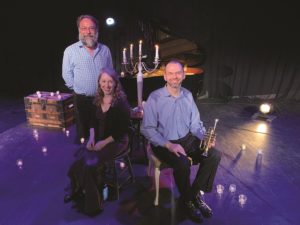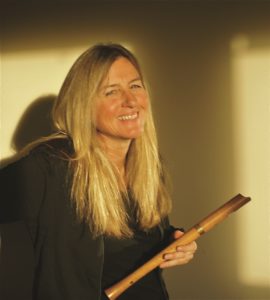PROVINCETOWN — Boston may be a mecca for it, but there is authentic Baroque music happening right here on the Outer Cape.
Great Music on Sundays @5 is presenting two virtual “Beauty of Baroque” concerts on Aug. 16 and 30. The Aug. 16 concert will be music for trumpet and soprano, with Greg Gettel, Elise Groves, and Frederick Jodry. The Aug. 30 concert will be flute music by the Bach family, with Eric Maul and Jodry. Both can be streamed for free at ptownmusic.com.
John Thomas, producer of Great Music on Sundays @5, says that the Baroque concerts, alongside the program’s Broadway events, are among its most popular. Spearheaded by Jodry, a harpsichordist, they have been happening since 2012.

Though the concerts have usually taken place before a live audience in the Unitarian Universalist Meeting House of Provincetown, they’ll be filmed this season at the Provincetown Theater. In past concerts, musicians used historical instruments, but this year, they’re playing on modern ones: piano, modern trumpet, and modern flute.
The Baroque period, roughly spanning from 1600 to 1750, was the heyday of Bach, Handel, and Vivaldi. The biggest misconception about Baroque music is that it’s stuffy. It’s quite the opposite. Baroque is similar to pop music, in terms of its repetition and satisfying harmonies. During the counterculture movement of the 1960s and ’70s, an early music revival sparked renewed interest in performances of Baroque, Renaissance, and medieval music, often on historical instruments.
Jodry got hooked on the harpsichord while in high school in the Midwest. His school was doing a production of Arsenic and Old Lace, and he thought the instrument would add ambience, so he borrowed one from a local university. “I immediately had an interesting, odd attraction to the sound,” he says. He went on to study the harpsichord at the New England Conservatory and found that “around Boston, early music is normal and prolific.”
Jodry believes that a historic locale such as Provincetown is well suited for playing Baroque music. Though the U.U. church was built about a century after Bach, it still has an antique feeling. “There were people living in Provincetown during Bach’s lifetime,” he says.
Groves, a Boston-based soprano who sings with the Handel and Haydn Society, says that Provincetown audiences are very receptive to Baroque music. She sees the value in performing it with modern instruments. “For so many of us, this is our first introduction to Baroque music,” she says. “It’s only later that we discover the joys of gut strings and early brass.”
Maul usually performs on the modern flute, but his approach will be different for the Baroque repertoire. “If you play Bach the same way you play Beethoven, you are going to butcher it,” he says. “I think of Baroque music as softer, more like velvet.”
He’s most looking forward to playing a sonata by Frederick the Great, who, in addition to being king of Prussia, was not a bad composer, having studied with C.P.E. Bach. Frederick was believed to have been gay and rumored to have taken Voltaire as a lover. “What I love about the sonata,” says Maul, “is it opens with a sicilienne, which was originally a very feminine song style.”

Roxanne Layton isn’t slated to play in the “Beauty of Baroque” concerts this year, but she remains Provincetown’s queen of Baroque music. Layton started playing the recorder at six years old, initially Renaissance and Baroque repertoire, but she soon branched out into jazz and pop. She frequently performs with Zoë Lewis, and recently appeared on “Wake Up! In Provincetown” playing Vivaldi, among other things.
She also tours with Mannheim Steamroller, the New Age, Baroque-inspired band whose name comes from a type of crescendo originating in 18th-century Germany.
Layton says the way she joined the group was kismet. She was working at Von Huene Workshop in Brookline making recorders. Listening to the radio one day, she called in and won tickets to a Mannheim Steamroller concert that evening. Coincidentally, the trumpet player from the band wandered into the shop 20 minutes later and, after hearing she had won tickets, invited her to his rehearsal.
One thing led to another, and she was allowed backstage after the concert, where she met the group’s founder, Chip Davis. After listening to a recording of her senior recital at New England Conservatory, he invited her to play Baroque sonatas on his next CD. “This was all within 24 hours of winning tickets,” Layton says.
What could be more modern? Baroque, as Layton puts it, is “18th-century rock ’n’ roll.”



